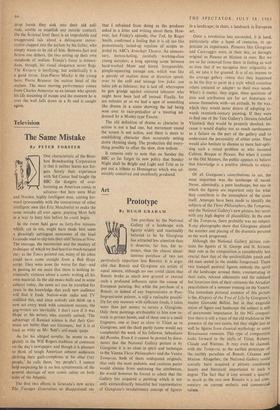Mr. Clark's reaction to the faraway scandals of the 1914
War is interesting. He agrees that to his generation—which did not even experience the Second Word War—the First 'is as remote as the Crimean, its causes and its personnal obscure and disreputable.' He chanced upon the 1915 diary of an officer in the Leinsters, 'and was overcome by the horror of the contents and the sense of resignation and duty that characterised the writing.' He realised, as suddenly as many of this generation, and with the same shock, that in its personal aspects the First War was incom- parably more horrible and murderous than the Second—that, for example, more British soldiers died in the first two hours of Loos than the total casualties of all three services on both sides on D-Day, 1944. It then seemed to him necessary to write a memorial for the old professional army that was destroyed in 1915; machine-gunned, gassed, and finally buried. 'Again and again they were called upon to attempt the impossible, and in the end they were all killed. It was as simple as that.'
As with every young man who comes to look seriously into this incomprehensibly evil period, he recoils from the crassness, pomposity, and even professional uselessness of the leadership which accepted this butchery. His title comes from the well-known exchange in Falkenbayn's Memoirs: Ludendorff : 'The English soldiers fight like lions.' Hoffman: 'True, but don't we know that they are lions led by donkeys.' Mr. Clark, then, comes one by one upon the
old familiar scandals with a new indignation, and stamps hard upon the many feet of clay. He finds that French was weak and vain and fond of women, that Wilson was 'morally tortuous,' that Haig was an insensitive snob, that Robertson was evasive and malicious, and so on. He dis- covers angrily that practically the whole boiling of them had this much in common : that they were mutually engaged in doing each other in the eye, while in the charnel-house ahead of them the BEF was drowning in its own blood. Here and there his urge to make a good case better leads him into somewhat selective quota- tion ' and arbitrary compression of well-known source material: the Haig Diaries, for example, are already revealing enough of a shallow mind without the need to quote passages out of con- text. But on the whole the facts are their own indictment.
Here, then, are two views of approximately the same period. Mr. Clark wanted 'to find out what happened to these men who 'endured for so long such incredible privations, such extremes of misery and squalor.' Mr. Collier, himself flinching from the Somme and man's inexhaust- ible capacity for self-destruction, says: 'But the biggest casualty of all was the reputation of the privileged class which, notwithstanding the shortcomings revealed by the Crimea, South Africa and the Somme, was, after all, best quali- fied to guide Western Europe through the perils of the post-war era.'
Such was that over-written war : death, delay, futility, chicanery, pain, boredom, endurance. That at least will never happen again. We can feel Mr. Clark's new-fund horror at the wicked- ness of 1915, and Mr. Collier's anxiety to justify one of its protagonists, but indeed it is long ago and far away, and it just doesn't matter any more.
1 vir,IP C II A T T0 alt W1N11USIII Told in Winter JON GODDEN 'Weird but real.' ISABEL QUIGLY, The Bookman 'The pressures of jealousy . . . are very well conveyed . . . credit* and poignant.'
RICHARD LISTER
I8s net
The Coining of Ftsbrizze
RAYMOND DE CAPITE 'The experience is not to be
missed.' The Times 'Filled with love, laughter and the joy of life.' New York Times 15s net (
E. M. Forster
PHAROS AND PHARILLON
A new edition Ss 6d net Two 1110GAHTEI PRESS ) ) ) ) ) ) ) )


































 Previous page
Previous page